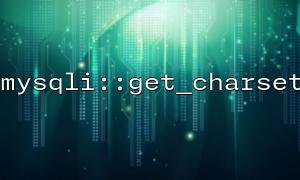When developing a PHP-based form submission system, it is important to ensure that the database character set is compatible with the submitted data. If the database character set is not set properly, it may cause garbled code problems or fail to store certain characters correctly. To avoid this, use the mysqli::get_charset function to check the character set of the current database to ensure that the system can handle various inputs.
This article will show you how to use the mysqli::get_charset function in the form submission system to check the compatibility of the database character set and adjust the system configuration based on the returned results.
First, you need to create a connection to the MySQL database. Using mysqli extensions can simplify database operations. Here is an example of a simple connection to a database:
<?php
$host = 'localhost'; // Database Host
$username = 'root'; // Database username
$password = ''; // Database Password
$dbname = 'test_db'; // Database name
// create MySQLi connect
$conn = new mysqli($host, $username, $password, $dbname);
// 检查connect是否成功
if ($conn->connect_error) {
die('connect失败: ' . $conn->connect_error);
}
?>
After connecting to the database, you can use the mysqli::get_charset function to get the character set used by the current database connection. This function returns a mysqli_char_set object containing the name of the character set. If the character set does not match expectations, you may need to change the database character set or adjust how the form input is encoded.
Here is an example code for how to check the current character set using the mysqli::get_charset function:
<?php
// Get the current character set
$charset = $conn->get_charset();
// Output the current character set
echo 'Current character set: ' . $charset->character_set_name;
?>
Suppose your form system receives user input and stores it in a database. If the user input contains special characters (such as Chinese, emoji, etc.), you need to make sure that the database's character set supports these characters. Common character sets, such as utf8mb4 , can support characters in multiple languages.
You can verify that the current character set is compatible with the target character set in the following ways:
<?php
// Set the target character set
$target_charset = 'utf8mb4';
// Get the current character set
$current_charset = $charset->character_set_name;
// 比较Current character set和目标字符集
if ($current_charset !== $target_charset) {
echo 'Current character set ' . $current_charset . ' Incompatible with the target character set ' . $target_charset . '。It is recommended to change the database character set。';
} else {
echo 'Current character set ' . $current_charset . ' Compatible with the target character set。';
}
?>
If the check finds that the current character set does not support special characters in the form data, you may need to adjust the database character set. You can use the following SQL commands to change the character set of a database:
ALTER DATABASE test_db CHARACTER SET = utf8mb4 COLLATE = utf8mb4_unicode_ci;
At the same time, you can also set the appropriate character set for tables and columns. Here is an example of modifying table and column character sets:
ALTER TABLE user_table CONVERT TO CHARACTER SET utf8mb4 COLLATE utf8mb4_unicode_ci;
Make sure the form's enctype and accept-charset settings are set correctly. To ensure that the data submitted from the form is encoded correctly, you can set the accept-charset property of the HTML form as follows:
<form action="submit.php" method="POST" accept-charset="UTF-8">
<input type="text" name="username">
<input type="submit" value="submit">
</form>
In PHP, using the mysqli::get_charset function can help you check the character set of the current database connection, ensuring that the database is compatible with user-submitted data. Maintaining character set consistency is essential for handling multilingual content and special characters when designing a form submission system. By checking and adjusting the character set, you can avoid problems such as garbled code or data loss.
Related Tags:
mysqli













